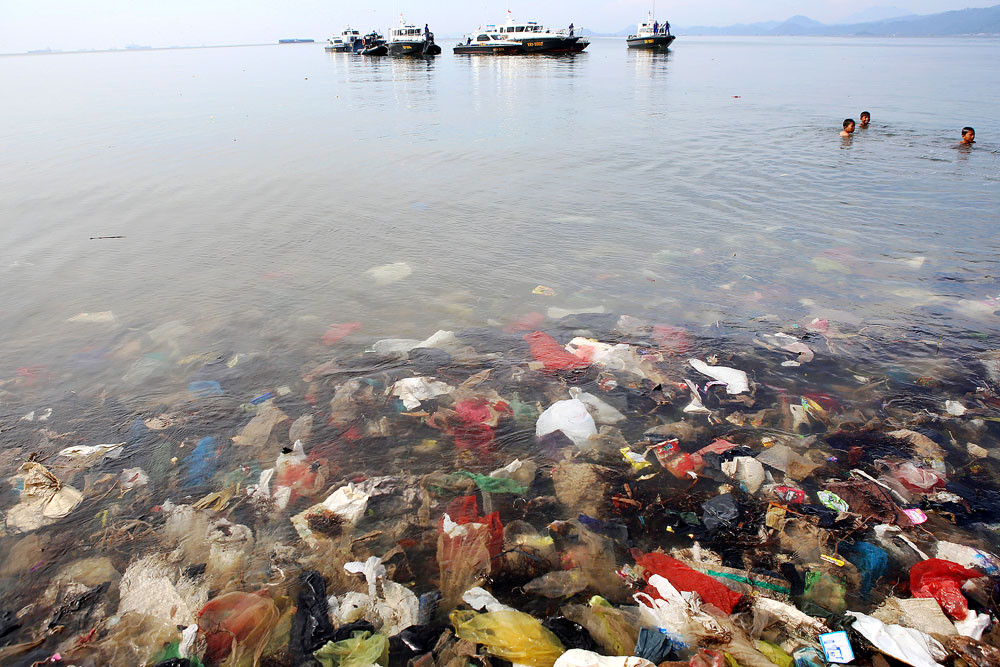Popular Reads
Top Results
Can't find what you're looking for?
View all search resultsPopular Reads
Top Results
Can't find what you're looking for?
View all search resultsNew marine debris action plan focuses on waste processing investment
The country's effort to curb marine plastic waste once and for all will need an investment totaling US$5.1 trillion until 2025, which will be earmarked for the development of state-managed waste collection and disposal facilities as well as private-owned recycling industries.
Change text size
Gift Premium Articles
to Anyone
A
s an effort to eradicate marine waste once and for all, the government has rolled out its latest action plan for authorities, businesses and communities to prevent plastic waste from ending up in the ocean by 2025.
Critics, however, doubt the latest plan will contribute to the country’s efforts in reducing marine debris due to poor waste management and reluctance from most companies to avoid single-use plastic products, which have been polluting the sea.
The joint action plan, unveiled by Maritime Affairs and Investment Coordinating Minister Luhut Binsar Pandjaitan on April 22, will become a guideline for all stakeholders to prevent plastic pollution from leaking into rivers, lakes and seas.
The stakeholders were joined in the Indonesia National Plastic Action Partnership (Indonesia NPAP), a part of a global partnership aiming to fast-track the circular economy. Indonesia is the first country to introduce its national-level partnership.
“Indonesia is committed to implementing programs on sustainable development and plastic waste reduction, which has become one of our national priorities,” Luhut said during the launch event late last month.
President Joko “Jokowi” Widodo pledged to reduce marine plastic waste by 70 percent by 2025 following a study by researcher Jenna Jambeck in 2015 that declared the country as the world’s second-worst marine plastic polluter for dumping about 1.29 million tons of plastic waste into the ocean in 2010.
While the government has been working to fix the problem, efforts still have a long way to go. A 2017 survey by the Indonesia NPAP showed that the country still dumped 680,000 tons of plastic waste to the sea annually, 10 percent of the total plastic waste produced in the archipelago.
Improper waste management and an ineffective recycling industry have been blamed for allowing such waste to escape into the sea.
Read also: Ineffective recycling compounds Indonesia’s marine waste problem
The action plan was expected to solve such problems, with its five key steps focusing on improving the country’s waste management, reducing or substituting plastic usage to prevent the consumption of 1 million tons annually, redesigning plastic products and packaging for reuse and recycling, doubling plastic waste collection rates, as well as expanding waste disposal facilities.
If the plan is implemented well, Indonesia NPAP projected it could reduce the amount of plastic going into the country’s oceans by 70 percent by 2025 and reach near-zero by 2040, as up to 16 million tons of plastics would be prevented from leaking into the sea until 2040.
The ministry revealed that investments totaling US$5.1 trillion would be needed until 2025 to realize the action plan. About $4 billion will be earmarked for the development of state-managed waste collection and disposal facilities, while the rest will be allocated for private-owned recycling businesses.
The ministry’s environment and forestry management acting undersecretary, Nani Hendiarti, said the partnership had also formed a task force to study which kind of investments were necessary to realize the action plan. It is also calculating how much money would be needed to carry out all the measures stipulated in the action plan.
The result will be included in a road map slated to be released in June.
“Later, we will know what quick wins and investments that the county will need,” Nani said.
She added that the investments for marine debris reduction could come from various sources, such as the state budget, the Global Plastic Action Partnership and its members as well as the Asian Development Bank (ADB).
Read also: The waste challenge: Is Indonesia at a tipping point?
The action plan was the latest guideline issued by the government in its effort to curb marine debris. In 2018, the government issued a presidential regulation that stipulated guidelines for ministries and state institutions to reduce marine plastic waste, which also focuses on land-based and ocean waste management, among other strategies.
While lauding the action plan, Sri Bebassari of the Indonesian Solid Waste Association urged the government to prioritize one of the five key points first, as the country’s development on waste management was “too far behind”.
The step in prioritizing a key point was necessary to push an immediate shift to the circular economy paradigm, she went on to say.
“The main priority should be to fix the waste management system on land, so no waste will slip away into the sea,” Sri said, emphasizing that the system should be able to sort waste so it would not get mixed together.
She added that the central government and regional administrations should also set aside more of their budget for waste management, so it would be seen as a necessity than economic gains for recycling companies.
Read also: Regions lag behind in waste management planning
Such concern over budgets was highlighted by Statistics Indonesia (BPS) in its 2018 environmental report, which pointed out that not a single province allocated more than 3 percent of its 2017 regional budget for the environment, including waste management.
“Income [from processing waste] should be an additional benefit, not the main focus of the business.”
Environmental group Greenpeace cast more doubt on the action plan, arguing that many companies were still promoting the “throwaway culture” that relies heavily on the usage of single-use plastic products, even though many had tried to promote circular economy approaches.
Greenpeace Indonesia campaigner Muhammad Atha Rosyadi added that he doubted the action plan would have much of an effect on the country’s production of marine plastic waste because five years would not be enough to work on the solutions.










